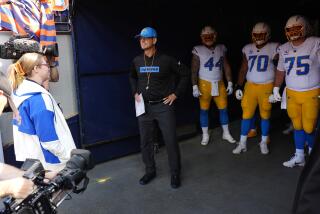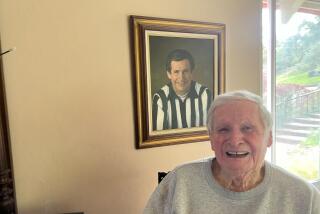Pro Football Players Testify Against Steroid Use : Physical and Psychological Dangers of Drugs Explained to Senate Committee
- Share via
WASHINGTON — All-pro lineman Bill Fralic of the Atlanta Falcons said here Tuesday that “steroid madness” pervades most locker rooms and weight rooms in professional football, and estimated that 75% of today’s linemen use the body-building drugs.
Steve Courson, who played with the Pittsburgh Steelers and the Tampa Bay Buccaneers until he retired in 1985, called himself “a man possessed” when he used anabolic steroids and said that they might have caused permanent damage to his heart. He said that doctors have given him five years to live.
“Every athlete pursues a dream and sometimes that dream can become distorted,” he said. “Winning is what I was concerned with. (Taking steroids) is the biggest regret of my life.”
Testifying before a Senate committee, members of football’s elite--including Fralic, Courson, Coach Chuck Noll of the Pittsburgh Steelers, Coach Bo Schembechler of the University of Michigan and Coach Joe Paterno of Penn State--testified as to the physical and psychological dangers of using steroids.
Sen. Joseph R. Biden (D-Del.), who has authored a bill making it illegal to transport steroids through the mail, called steroid use widespread and said that action must be taken soon to prevent their abuse.
“We did not focus enough attention on the cocaine problem in the late 1970s and early 1980s, with disastrous results,” he said. “We cannot afford to repeat that mistake” with steroids.
In addition to the side effects, however, Biden said that use of steroids by football players teaches youths that “it’s OK to take short cuts to achieve success--whether it’s using drugs, or cheating, or anything else.”
Fralic and Courson agreed.
“Steroid use is rampant among the NFL, and that includes my own team,” Fralic told senators on the Judiciary Committee. “It is rampant in colleges and it is rampant in high schools. Everybody is blind to it because they choose to ignore what is happening.”
It is, he said, an epidemic that is spreading because of the “win-at-all-cost” attitude prevalent at all levels of football. Citing his own brief experience with steroids, Fralic recalled how all he wanted was “to be the best.”
Courson remembered the pressure, too. In college, he said, steroids helped him develop speed, size, intensity and strength. In the NFL, Courson said, the drugs helped him compete in NFL strong-man contests and gave him the “mind-set of a mercenary.”
His heart permanently weakened by the drugs, Courson testified, he lost his starting position and eventually retired.
“Steroids were hard to quit until the point where, mentally, I didn’t care about being competitive,” he said.
There is little agreement, however, about what should be done to stop steroid use by athletes.
Seven weeks ago, Pete Rozelle, retiring commissioner of the National Football League, wrote new rules that imposed tough sanctions on players who tested positive for steroid use.
Rozelle told the Senate panel Tuesday that he advocates “periodic, unscheduled testing” as the best way to detect the drug and deter athletes from using it.
But the football players’ union long has been opposed to random testing, successfully challenging the provision in a 1986 NFL anti-drug proposal. The NFL tests players only once a year, before summer camp, or if there is reason to suspect steroid use.
“Until the players say they are in favor of random testing, we are opposed to it,” Gene Upshaw, executive director for the NFL Players Assn., told the committee.
Paterno and Schembechler both testified that some players probably use steroids at their schools and said that a combination of testing, education and discipline is needed to combat the trend.
“Steroids do give players an advantage,” Paterno said. “That’s basically the problem.”
More to Read
Go beyond the scoreboard
Get the latest on L.A.'s teams in the daily Sports Report newsletter.
You may occasionally receive promotional content from the Los Angeles Times.










